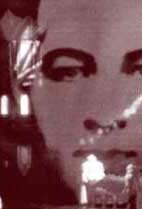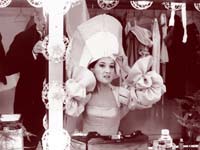Minnesota Romantic | Operas | Song Cycles | Choral Works | Orchestral | The Teacher/Composer | Timeline Part 3: Song Cycles Argento does not require the full apparatus of the stage to probe the human condition. Some of his most effective works are drawn on a small scale. These are the songs, widely performed and recorded, that may be his guarantee of immortality. Dramas in miniature, the song cycles, like the operas, are masterpieces of characterization. For instance, Letters from Composers, commissioned by tenor Vern Sut-ton and guitarist Jeffrey Van in 1967, deals not with the art of the seven selected composers but with their personalities and struggles. Bach, for example, in an outburst of florid phrases encrusted with Baroque ornamentation, in politest language vents his outrage to his employers, the Leipzig Town Councilors, for cheating him out of a fee. In the span of a few minutes, the episode forms a complete dramatic scena.
Sutton, who has sung nine first performances of Argento works, finds Argento's pieces singable because of their under lying structure. "The music reflects a logic that is [Argento's] alone—not dissimilar from Benjamin Britten, yet not the same," Sutton explains. "Usually it's very easy to memorize. It may look difficult on paper, but the combination of the notes is so logically put together that you never forget it." Remarking on Argento's ability to master the art of writing for guitar, Van says, "The notes are only one element. The marking of them—the accents, dynamics, expression marks—is what brings the music to life. Argento designates every nuance." Commissioned by The Schubert Club of St. Paul to provide a new work for mezzo-soprano Janet Baker upon the first recital presented at Orchestra Hall in its 1974-75 inaugural season, Argento found a set of personal, compelling texts in the journals of Virginia Woolf. Selecting eight brief entries, three from the tormented last year of her life, he created a multidimensional portrait of the writer culminating in a despondent final entry, shortly before her suicide. The cycle, From the Diary of Virginia Woolf, won the 1975 Pulitzer Prize for music. A critic for High Fidelity magazine said the piece demonstrates "a skill and understanding which have staked out for Argento an impressive claim as one of America's ablest composers for the voice."
Casa Guidi is no less intimate, although scored for a large orchestra. It was commissioned by the Minnesota Orchestra and premiered under Neville Marriner with mezzo-soprano Frederica von Stade in 1983.Argento happened upon the idea not far from his favorite quarters in Florence, where he often spends the summer. Just across the street from the Pitti Palace stands Casa Guidi, the house that Elizabeth Barrett Browning and Robert Browning shared after they eloped. From selected letters she addressed to her sister in London, Argento took the risk of producing a song cycle dealing not with marital tensions but with radiant happiness. The music's appealing melodies and warm harmonies (again stepping out of a tone row) capture the womanly emotions of the text. In the final song, "Domesticity," the composer portrays the Brownings by the hearth. Their serenity is tinted with the resonance of distant bells, whose tolling has been an Argento emblem in many scores, including Reverie, Reflections on a Hymn Tune, composed for the Minnesota Orchestra's 1998 European tour. Typically, all these works end quietly—even Reverie, which, by request, mounts to an engulfing climax only to die in the final bar upon the fading of chimes. Argento does not need to make a splash to draw an ovation. Not to be overlooked among the dramatic song cycles is his most recent: A Few Words About Chekhov (a Schubert Club commission of 1996), premiered by Frederica von Stade and baritone Håken Hagegård (for whom Argento wrote The Andrée Expedition, a journal-based account of a failed expedition to the North Pole). In his third Chekhov-inspired work, Argento provides yet another deep glimpse into a private relationship. The incidents are drawn from the last years of the playwright and the actress Olga Knipper, whom he wed in 1901, as found mainly in an essay of Knipper's. Alternating solo voices and duets, the theatrically presented cycle proceeds from their first meeting to the writer's death. Like a capsule opera, the vocal outpourings span a breadth of emotion, while the piano commentary evokes the atmosphere. Argento's love of the singing voice—which he calls "our representation of humanity"—is reflected in everything he has written, including the instrumental works. To him, instruments imitate the human voice.
I grew to love the voice by loving the singer," Argento says, referring to his wife, a fellow Peabody student who has been the first interpreter of many of his works. Indifferent to critics, he has needed but one: Carolyn, who in their early Minnesota years was better known than he. "She was the star," Vern Sutton remembers. "People knew about her and her beautiful voice. When I first performed Argento's music, she would carefully offer some helpful thoughts, and she has been known to leave little suggestions on the manuscripts on his piano rack. Carolyn is the other set of ears in the Argento household."
|
||||||||||||||||||||||||||||
MPR Home | News | Music Collection | Events | Radio Listening | Your Voice | About Us | Support Us | Help ©2005 Minnesota Public Radio | Terms of Use | Privacy Policy |


